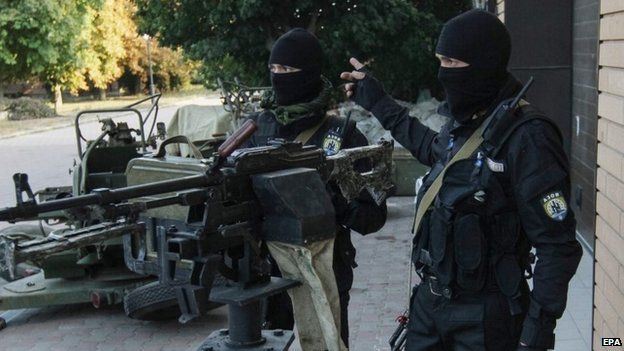Ukraine crisis: Rebels defiant over new self-rule law
- Published

A senior Ukrainian rebel leader has told the BBC that a new law granting self-rule to parts of the east will not sway the demand for independence.
Andrei Purgin said there were no plans to develop any political relationship, federal or otherwise, with Ukraine.
The new law is part of a truce agreed between separatists and the Ukrainian government, after months of conflict.
Meanwhile two civilians were killed by fighting in the eastern city of Donetsk on Wednesday, officials said.
The new law, which affects Donetsk and Luhansk regions and is in line with the 5 September ceasefire, was condemned by some Ukrainian MPs as "capitulation".
The truce has held despite sporadic fighting between the two sides over the past 12 days.
'Invitation to negotiate'
Mr Purgin, the first vice-prime minister of the so-called Donetsk People's Republic, said there were "positives" in the move by MPs to grant self-rule and an amnesty to pro-Russian rebels.
He said the MPs' move was in effect "an invitation to the negotiation table", but rebels would not give up on a desire for "the Russian world".
"The first positive thing is that we are no longer described as terrorists. Secondly, according to this law we have the right to foreign and political economic relationships."
The rebels in the east have been battling Ukrainian troops since seizing a number of towns in April.
Mr Purgin said Ukraine's parliament only voted on laws for Ukraine, and "we have our own higher council which makes our own laws".
He also accused Europe of quietly wanting "the ethnocide of Russian speakers in Ukraine".
"There are thousands of dead who were fighting for the rights of Russian-speaking citizens. For the rights to be part of the Russian world. For the right to be Russians," he said.
Mr Purgin added: "Ukraine is the most rotten, poor, corrupt country of Europe. It's the cesspool of Europe."
Ukrainian President Petro Poroshenko said the new legislation giving the special status to parts of Donetsk and Luhansk for three years would guarantee the "sovereignty, territorial integrity and independence" of Ukraine, while paving the way for decentralisation.
The amnesty does not cover the shooting down of the MH17 passenger plane in July.
Western leaders believe rebels shot down the Malaysia Airlines jet with a Russian missile - a charge the rebels and the Kremlin deny.
The legislation means that pro-Russian separatists taken prisoner in the fighting should now be released.
There were celebrations in the European and Ukrainian parliaments after the agreement was ratified, as Alpa Patel reports
Separatists holding government buildings are now supposed to leave them, hand over captured Ukrainian soldiers and other prisoners and surrender their weapons.
Rebels accused of other "grave" crimes will not be covered by the new amnesty either.
But some Ukrainian lawmakers described the self-rule law as a sell-off of Ukraine in what they see as a war against Russia.
At least 3,000 people have been killed in the conflict and more than 310,000 internally displaced in Ukraine, the UN says.
Ukraine and the West have accused Russia of backing the separatists with soldiers and heavy weapons. The Kremlin denies doing so.
On Wednesday, shelling near a market in north Donetsk killed two civilians and injured three, Donetsk city council said.
Fighting in the area has been centred around the airport, which is under the control of government forces.
Free trade
On Tuesday, the Ukrainian and European parliaments also voted to ratify a major EU-Ukraine association agreement that aims to bring the ex-Soviet republic closer to the EU.
The agreement lies at the root of Ukraine's crisis.
It was former President Viktor Yanukovych's refusal to sign the deal last November that triggered mass protests and his eventual fall from power.
The agreement would make Ukraine compliant with EU standards in the areas of human rights, security and arms control, and would remove trade barriers.
But negotiations with Russia last week led to the free-trade part of the agreement being postponed until 2016.
Media reaction: By Santo Cullura, BBC Monitoring
Ukraine's mainstream press sees the EU association agreements that were ratified on Tuesday as putting the country "At the EU threshold", in the words of the headline in popular tabloid Segodnya.
But commentators are not impressed by parliament's approval for a bill granting self-rule to the rebel-controlled regions in eastern Ukraine.
"This is a great victory for Putin and the Kremlin, because now they have the legitimisation of their terrorist groups in Ukraine", says a commentary in the daily Den.
"President Poroshenko will be held to account for Donbass' 'special status' at the next presidential election, if he decides to run for a second term," says Ukrayina Moloda daily.
Some media voices suggest the self-rule deal was the right move, considering the circumstances. The adoption of the law "paves the way for the solution to the crucial gas problem on fairly good conditions for Ukraine," according to pro-Russian tabloid Vesti.
Ukrainian social media users are more forthright, expressing outrage at parliament's approval for the bill on special status. Anger and scepticism from activists and pundits is directed not only at MPs who voted behind closed doors on 16 September, but also at President Poroshenko.
"Putin won, and the war didn't achieve anything. It's a betrayal of Ukraine and all those who died in the fight for Donbass," says one prominent activist on Facebook, in a comment echoed by others on Ukrainian social media.